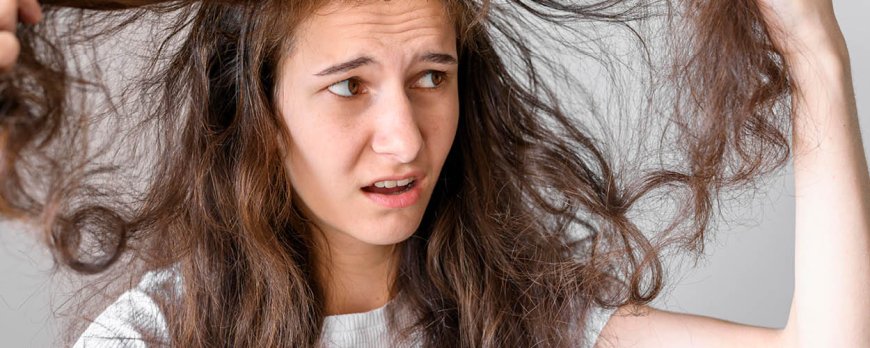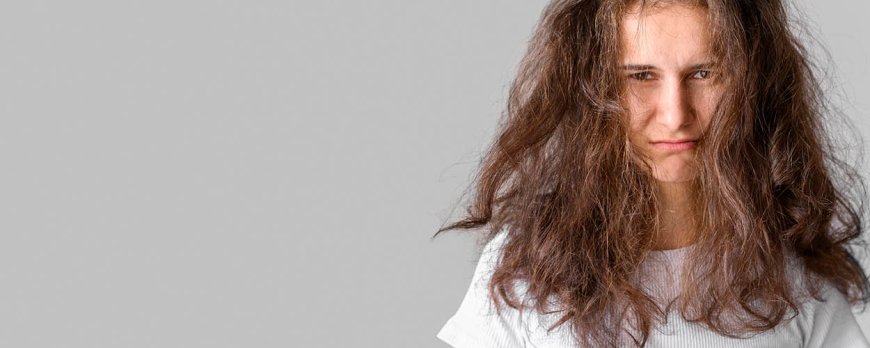Why is my hair stuck at the same length?
Uncover the mystery of 'Why is my hair stuck at the same length?' in our comprehensive guide that decodes your hair growth challenges.

Why is my hair stuck at the same length?
Have you ever wondered why your hair seems to be stuck at the same length no matter what you do? There could be several reasons behind this common hair growth plateau. Issues such as breakage, split ends, genetics, age, poor hair care routine, and underlying medical conditions may all contribute to your hair growth struggle.
Key Takeaways:
- Breakage and split ends can hinder hair growth, so it's important to avoid over-processing, excessive heat styling, and aggressive styling. Regular trims can help prevent split ends.
- Genetics and age play a role in hair growth, with each person having a unique hair growth cycle that may limit the maximum length their hair can reach.
- Poor diet and exercise habits, as well as a buildup of oil and products on the scalp, can hinder hair growth. Implementing a healthy lifestyle can support optimal hair growth.
- A proper hair care routine, including regular washing, conditioning, and gentle handling of your hair, is essential for promoting growth.
- If your hair growth isn't progressing as expected, it's advisable to consult with a doctor to rule out any underlying medical conditions that may be affecting your hair.
Possible Causes of Hair Growth Plateau
Several factors can contribute to your hair growth stall, including breakage, split ends, genetics, age, and other lifestyle factors. Breakage is a common issue that can occur from over-processing your hair with chemicals or using hot tools too frequently. Aggressive styling and not properly caring for your hair can also lead to breakage, which hinders hair growth. To prevent breakage, it's essential to handle your hair gently and avoid excessive heat styling. Furthermore, regular trims are necessary to get rid of split ends, as they can prevent your hair from growing longer.
Genetics and age can also play a role in hair growth. Each person has a specific hair growth cycle that determines the length their hair can reach. Some individuals may have a shorter growth phase, while others may have a longer period. Additionally, hair growth tends to slow down as you age, which is why it may seem like your hair is stuck at the same length. Understanding your hair's natural growth cycle can help you manage your expectations and adjust your hair care routine accordingly.
Other lifestyle factors can also affect your hair growth. Poor diet and exercise habits can hinder hair growth, as your hair needs essential nutrients to thrive. A diet lacking in vitamins and minerals can weaken your hair and slow down growth. Regular exercise improves blood circulation, which is essential for delivering nutrients to the hair follicles. Meanwhile, a buildup of oil and products on the scalp can suffocate the hair follicles, inhibiting hair growth. Ensuring a clean and healthy scalp is crucial for optimal hair growth.
To overcome your hair growth plateau, it's important to have a proper hair care routine and consider implementing healthy habits. This includes regular washing and conditioning of your hair, using suitable styling products, and avoiding harsh chemicals. Natural remedies such as using essential oils or massaging your scalp can also nourish your hair and promote growth. Additionally, maintaining a balanced diet rich in vitamins, minerals, and healthy fats can support hair health. Lastly, stress management and avoiding excessive heat styling can contribute to overall hair growth. If your hair isn't growing as expected, it's always advisable to consult with a doctor to rule out any underlying medical conditions that may be impacting your hair growth.

Understanding Breakage and Split Ends
Breakage and split ends can be major roadblocks to achieving longer hair. Understanding the causes and implementing proper hair care practices can help you break free from this hair growth plateau.
One of the main causes of breakage and split ends is over-processing your hair with chemicals and excessive heat styling. When you subject your hair to these harsh treatments too frequently, it weakens the strands and leads to breakage. Similarly, aggressive styling techniques, such as tight ponytails or braids, can put stress on the hair and cause it to break.
Not properly caring for your hair can also contribute to breakage and split ends. Failing to moisturize and nourish your hair can make it more prone to breakage. It's important to use a gentle shampoo and conditioner, and to regularly deep condition your hair to keep it hydrated and healthy.
To prevent split ends, regular trims are essential. When split ends are left untreated, they can travel up the hair shaft and cause more breakage. Trimming your hair every 6 to 8 weeks helps to remove damaged ends and promote healthier hair growth.
Tips to Prevent Breakage and Split Ends:
- Avoid excessive heat styling and use heat protectant products
- Limit the use of chemical treatments and opt for more natural alternatives
- Handle your hair gently and avoid aggressive styling techniques
- Moisturize and nourish your hair regularly with deep conditioning treatments
- Protect your hair while sleeping by using a silk or satin pillowcase
By understanding the causes of breakage and split ends and implementing these hair care practices, you can promote healthier hair and break free from the hair growth plateau. Remember to be patient, as it takes time for your hair to grow, but with proper care, you can achieve the longer hair you desire.

The Role of Genetics and Age in Hair Growth
Genetics and age play a significant role in determining the maximum length your hair can achieve. Understanding this factor can help manage your expectations and tailor your hair care routine accordingly.
- Genetics: Each person has a unique hair growth cycle that is largely determined by genetics. This means that your hair may naturally have a predetermined maximum length it can reach. While you can't change your genetics, you can focus on optimizing the health and condition of your hair to ensure it reaches its full potential.
- Age: As we age, our hair growth tends to slow down. The rate of hair growth may not be as fast as it was in your younger years, and the maximum length your hair can reach may become more limited. This is a natural part of the aging process, but there are still steps you can take to support healthy hair growth as you age.
How to Manage Genetics and Age for Better Hair Growth
While you can't change your genetics or stop the aging process, you can adopt certain practices to optimize your hair's growth potential:
- Healthy Hair Care Routine: Implement a proper hair care routine that includes regular washing, conditioning, and gentle handling of your hair. Avoid over-processing your hair with chemicals and excessive heat styling, as these can lead to breakage and hinder hair growth.
- Diet and Exercise: Maintain a balanced diet rich in essential nutrients, such as vitamins A, C, and E, as well as biotin and iron, which are important for healthy hair growth. Regular exercise can also improve blood circulation to the scalp, promoting hair growth.
- Scalp Health: Keep your scalp clean and free from buildup of oil and products, as a healthy scalp provides a conducive environment for hair growth. Consider using a gentle clarifying shampoo or exfoliating scalp treatment to remove any excess buildup.
By understanding the role of genetics and age in hair growth, you can set realistic expectations and adopt the right strategies to support your hair's natural potential. Incorporating these practices into your hair care routine can help optimize growth and ensure your hair looks its best at any length.

The Impact of Diet, Exercise, and Scalp Health on Hair Growth
Your overall health and lifestyle habits can significantly influence the growth of your hair. Discover how your diet, exercise routine, and scalp health can impact your hair length.
A poor diet and sedentary lifestyle can hinder hair growth. Your hair needs essential nutrients, such as vitamins A, B, C, D, and E, as well as minerals like iron and zinc, to thrive. Incorporating a balanced diet rich in fruits, vegetables, lean proteins, and whole grains can provide your hair with the necessary building blocks for growth. Additionally, regular exercise improves blood circulation, delivering vital nutrients to your hair follicles and promoting healthy hair growth.
Scalp health is another crucial factor in hair growth. A buildup of oil, product residue, and dead skin cells can clog hair follicles, impeding hair growth. It is important to cleanse your scalp regularly to remove this buildup. Use a gentle shampoo that suits your hair type and follow with a nourishing conditioner. Avoid using excessive heat styling tools, as they can further dehydrate your scalp. Instead, opt for heat-free styling techniques whenever possible.
Here are some hair growth remedies to consider:
- Gentle scalp massages help stimulate blood flow to the hair follicles.
- Using a wide-toothed comb or a brush with natural bristles can minimize hair breakage.
- Incorporating essential oils, such as lavender or rosemary, into your hair care routine can promote hair growth. Dilute a few drops of the oil with a carrier oil, such as coconut or jojoba oil, and gently massage into the scalp.
- Consider using a clarifying shampoo once a week to remove any buildup on your scalp.
If you've been struggling with stagnant hair growth, addressing your diet, exercise routine, and scalp health can make a noticeable difference. Implementing healthy habits and nourishing your hair from the inside out can help break through your hair growth plateau. However, if your hair isn't growing as expected, it's always a good idea to consult with a doctor to rule out any underlying medical conditions that may be affecting your hair.

Maintaining a Proper Hair Care Routine
Establishing and maintaining a proper hair care routine is crucial for overcoming hair growth challenges. By adopting the right habits and utilizing effective remedies, you can kickstart your hair growth journey and achieve the length you desire. Here are some helpful tips and remedies to consider:
- Gentle washing: Use a mild shampoo and conditioner that suits your hair type, and avoid excessive scrubbing or harsh chemicals that can strip away natural oils.
- Regular conditioning: Condition your hair after every wash to keep it moisturized and reduce the risk of breakage. Focus on the ends and avoid applying conditioner to the scalp to prevent buildup.
- Trimming split ends: Regularly trimming split ends is essential to prevent them from traveling up the hair shaft and causing further breakage. Aim to get a trim every 6-8 weeks.
- Avoiding heat styling: Excessive heat from styling tools can damage the hair and hinder growth. Whenever possible, allow your hair to air dry and limit the use of hot tools. If you must use heat styling, apply a heat protectant spray beforehand.
- Deep conditioning treatments: Treat your hair to a deep conditioning treatment once a week to provide extra nourishment and moisture. Look for products that contain hydrating ingredients such as argan oil or shea butter.
Remember, consistency is key when it comes to a hair care routine. Stick to these tips and remedies, and be patient as hair growth takes time. Along with maintaining a proper hair care routine, consider implementing healthy habits such as consuming a balanced diet, exercising regularly, managing stress levels, and avoiding excessive use of harsh chemicals on your hair. By taking a holistic approach, you can optimize your hair growth and achieve the results you desire.
Seeking Professional Advice for Hair Growth Concerns
If you've tried various strategies and your hair growth remains stagnant, it's wise to consult with a healthcare professional to rule out any underlying medical conditions. While breakage, split ends, genetics, age, and poor hair care routine are common causes of hair growth plateau, there may be other factors at play. A doctor can help diagnose any potential underlying medical conditions that may be hindering your hair growth.
During your consultation, the doctor will ask about your hair care routine, lifestyle habits, and any changes in your overall health. They may also perform tests to check for hormonal imbalances, nutrient deficiencies, or underlying medical conditions, such as thyroid disorders or autoimmune diseases. By identifying and addressing these underlying issues, you can take the necessary steps to promote hair growth.
Additionally, a healthcare professional can provide guidance on the best course of action for your specific situation. They may recommend specific hair care products, dietary changes, or treatments to stimulate hair growth. They can also offer advice on how to improve your overall scalp health, which is essential for healthy hair growth.
Remember, seeking professional advice is crucial if you're experiencing difficulty in achieving hair growth. A doctor can provide personalized recommendations and ensure that you're taking the right steps towards resolving your hair growth concerns.
Lifestyle Changes for Optimal Hair Growth
Making certain lifestyle changes can go a long way in promoting healthy hair growth. Discover some simple yet effective habits that can support the length you desire.
- Follow a Balanced Diet: What you eat has a direct impact on your hair health. Include foods rich in vitamins, minerals, and proteins, such as leafy greens, nuts, fish, and lean meats, in your diet. A well-nourished body will have a positive effect on your hair growth.
- Stay Active: Regular exercise improves blood circulation, which is essential for delivering nutrients to the hair follicles. Engage in activities like jogging, swimming, or yoga to keep your body active and promote healthy hair growth.
- Manage Stress: Chronic stress can disrupt your hair growth cycle. Find healthy ways to manage stress, such as practicing mindfulness techniques, engaging in hobbies, or seeking support from friends and family.
- Avoid Heat Styling: Excessive heat styling can damage your hair and hinder its growth. Minimize the use of hot tools like flat irons and curling wands. Instead, embrace natural hairstyles or use heat protectant products when necessary.
- Protect Your Hair: Use a wide-toothed comb or a detangling brush to gently handle your hair, especially when it's wet. Avoid pulling or tugging, as it can cause breakage. Additionally, protect your hair from harsh weather conditions by wearing a hat or using a scarf.
By incorporating these healthy habits into your lifestyle, you can support optimal hair growth. Remember, consistency is key, and it may take time to see noticeable changes. If you're still struggling with hair growth despite implementing these changes, it's advisable to consult with a doctor to rule out any underlying medical conditions.
Conclusion
Understanding the reasons behind your hair growth plateau and implementing effective strategies can help you overcome this challenge and achieve the hair length you desire.
If you're wondering why your hair is stuck at the same length, there are several possible reasons. One common issue is breakage, which can occur from over-processing your hair with chemicals or using hot tools too frequently. Aggressive styling and not properly caring for your hair can also lead to breakage. Split ends can also prevent your hair from growing longer, so it's important to regularly trim them.
Genetics and age can also play a role in hair growth, as each person has a specific hair growth cycle that may limit the length their hair can reach. Additionally, poor diet and exercise habits, as well as a buildup of oil and products on the scalp, can hinder hair growth. It's important to have a proper hair care routine and consider implementing healthy habits to support hair growth. Finally, if your hair isn't growing as expected, it's a good idea to consult with a doctor to rule out any underlying medical conditions.
FAQ
Why is my hair stuck at the same length?
There are several possible reasons for your hair being stuck at the same length. Common issues include breakage from over-processing or excessive heat styling, as well as aggressive styling and not properly caring for your hair. Split ends can also prevent hair from growing longer, so it's important to regularly trim them. Genetics and age can also play a role, as each person has a specific hair growth cycle. Additionally, poor diet and exercise habits, as well as a buildup of oil and products on the scalp, can hinder hair growth. It's advisable to consult with a doctor to rule out any underlying medical conditions.
What are the possible causes of hair growth plateau?
Hair growth plateau can be caused by factors such as breakage from excessive styling or lack of proper hair care, split ends, genetics, age, poor diet and exercise habits, and scalp health issues.
How does breakage and split ends affect hair growth?
Breakage and split ends can hinder hair growth. Over-processing hair with chemicals, excessive heat styling, aggressive styling, and lack of proper hair care can lead to breakage. Regular trims are essential to prevent and manage split ends.
How do genetics and age impact hair growth?
Genetics and age can affect hair growth. Each person has a unique hair growth cycle that may limit the maximum length their hair can reach. Hair growth tends to slow down as you age.
What is the impact of diet, exercise, and scalp health on hair growth?
Poor diet and exercise habits can hinder hair growth. It's important to maintain a balanced diet rich in essential nutrients and lead an active lifestyle. Additionally, a buildup of oil and products on the scalp can also impede hair growth. Keeping your scalp clean and healthy is crucial for promoting hair growth.
How can I maintain a proper hair care routine?
To support hair growth, it's essential to have a proper hair care routine. This includes regular washing, conditioning, and gentle handling of your hair. There are also natural remedies and products available that can nourish your hair and promote growth.
When should I seek professional advice for hair growth concerns?
If your hair growth isn't progressing as expected, it's a good idea to consult with a doctor. They can help diagnose and address any underlying medical conditions that may be impacting your hair growth.
What lifestyle changes can I make to support hair growth?
Implementing healthy habits such as maintaining a balanced diet, engaging in regular exercise, managing stress, and avoiding excessive heat styling and harsh chemicals can support optimal hair growth.































































































































